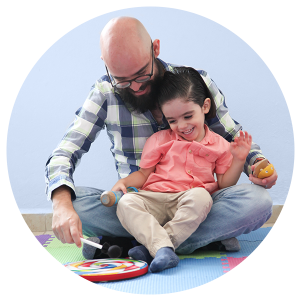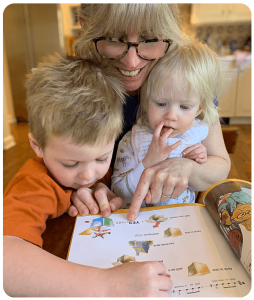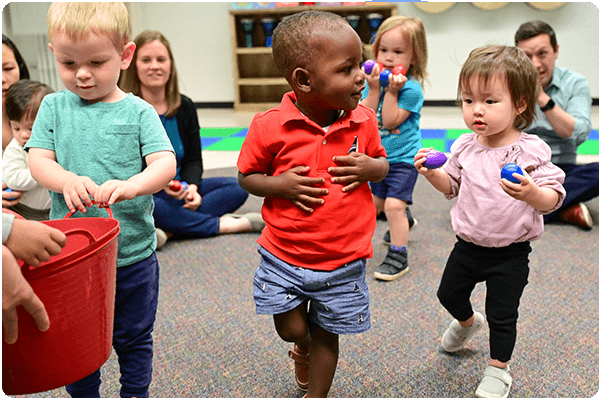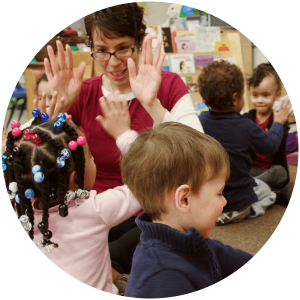Between preschool, playdates, and activities, three- and four-year-olds can have super-busy schedules! With so many demands on their (and YOUR) time, we’re sometimes asked whether it makes sense for these not-so-littles to continue their Music Together® classes. As you plan your family’s schedule, here are a few answers to your questions that give insights into how music benefits preschoolers and complements their growing curiosity and confidence.

Question: At four, Ollie already sings and dances all the time (thanks to Music Together, he has better pitch and rhythm than me!). What else can he learn from continuing class?
Answer: It sounds like Ollie is well on the way to Basic Music Competence (BMC), and the learning doesn’t stop there! Music, like language, develops over time through continuous exposure and experimentation. By continuing in Music Together® classes, older children with BMC will begin to gain music fluency, which is important for formal music or movement lessons children often want to try in elementary school.
Did you know?
If you take a semester or two of French lessons, you will be able to get by when you visit France. However, it is only through continued exposure and opportunities to use the language, that you will gain fluency in French. Fluency is what allows you to fully express yourself and get creative with the new language you’ve learned (whether it’s French or the “language” of music!).

Question: Three years ago, when Luna was a baby, we took a class with the Fiddle Song Collection, and I see it’s coming up again this fall. Does it make sense to skip that session?
Answer: As adults with fully formed brains and personalities, we may not change that much in three years—but think about how much Luna has grown since they were a baby! The second time through a song collection is often an entirely new experience for a child, since they are in such a different place cognitively, socially, linguistically, physically, emotionally, and musically. Plus, when children already know the songs, thanks to early exposure, they have the opportunity to refine and synthesize their skills and knowledge across multiple developmental domains.
Did you know?
A parent recently compared coming back to a song collection to her six-year-old rediscovering her old dolls. When the child was about three, they seemed to have moved on to other toys, so the dolls were packed up dolls and Mom forgot about them. To her surprise, three years later, she found that her little one had found the box and was playing with the dolls again, but in an entirely new, more sophisticated way now that she was six. Similarly, children play with songs they once knew in different ways as they get older.
Question: Should our three-and-half year-old, Matteo, stay in a class with younger kids now that they are more independent?
Answer: As you know, Music Together family classes are taught in mixed-age groupings of children from birth through age five, so that all members of a family can learn—and play!—together. As one of the older children in class, Matteo will have more opportunities be a class leader that the younger students can look up to. This builds important life skills: confidence, empathy and social understanding. In fact, regardless of their temperament, children are more likely to take on a leadership role if they are the oldest in a group. Plus, when children of varying ages play and learn together, the environment tends to be more creative, less competitive, and more fun. And, more fun leads to more learning! (Read more about the surprising benefits of mixed-age classes.)

Did you know?
In a study published in the Journal of Research in Childhood Education (Vol. 20 #2, December 2005), the authors identified an interesting characteristic of older children in a mixed-age environment. They suggest that a leadership temperament often emerges early, and that being the oldest in the group can catalyze leadership where it is not otherwise readily apparent. This is particularly true in a play-based environment (such as Music Together). It is suggested that decision-making opportunities, such as providing choices of activities or materials, help to develop these skills. Therefore, being among the oldest in a class becomes especially important for those children who may not have exhibited a leadership temperament.
Question: It’s time for my 3-year-old, Gerard, to start preschool, and we don’t want to over-schedule them.

Answer: It’s totally understandable to not want to fill your child’s schedule with too much, especially since they are starting school. Continuing to include Music Together in your preschooler’s weekly routine can provide comfort during the sometimes difficult move from home to school. The familiarity of the music and classroom make it a safe space for your child to get creative and deepen their learning through play and experimentation. Because Music Learning Supports All Learning®, the time they spend in Music Together will enrich what they are learning in preschool. Another benefit? You continue to participate right alongside them, keeping yourself an active part of their music-learning, and deepening family bonds through music-making.
Did you know?
You might also want to look for a school that uses the Music Together in School curriculum, which integrates the familiar Music Together songs into everyday classroom life, further easing that transition from home to school. Search for a participating school near you on our Class Locator, or email in-school@musictogether.com to learn more.
If you have a question about your child’s music development please email it to news@musictogether.com.



